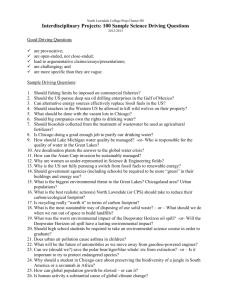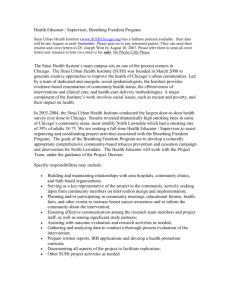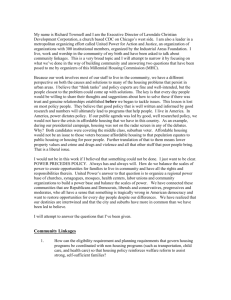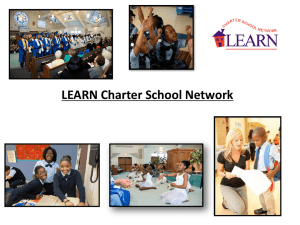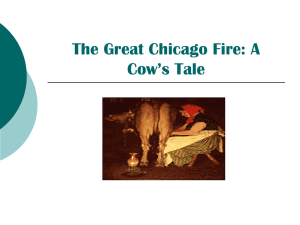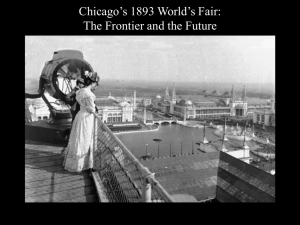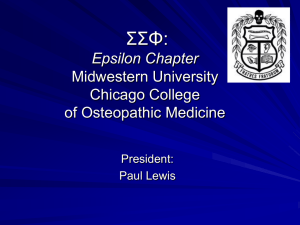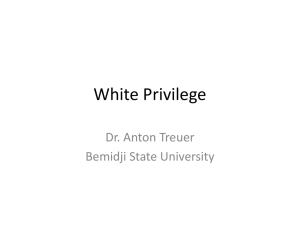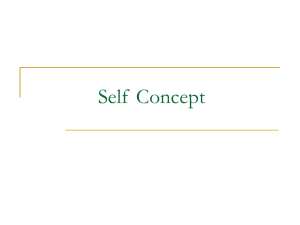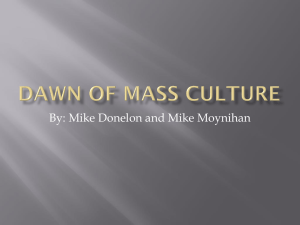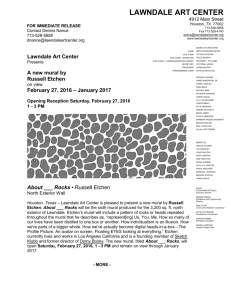History - North Lawndale College Prep
advertisement
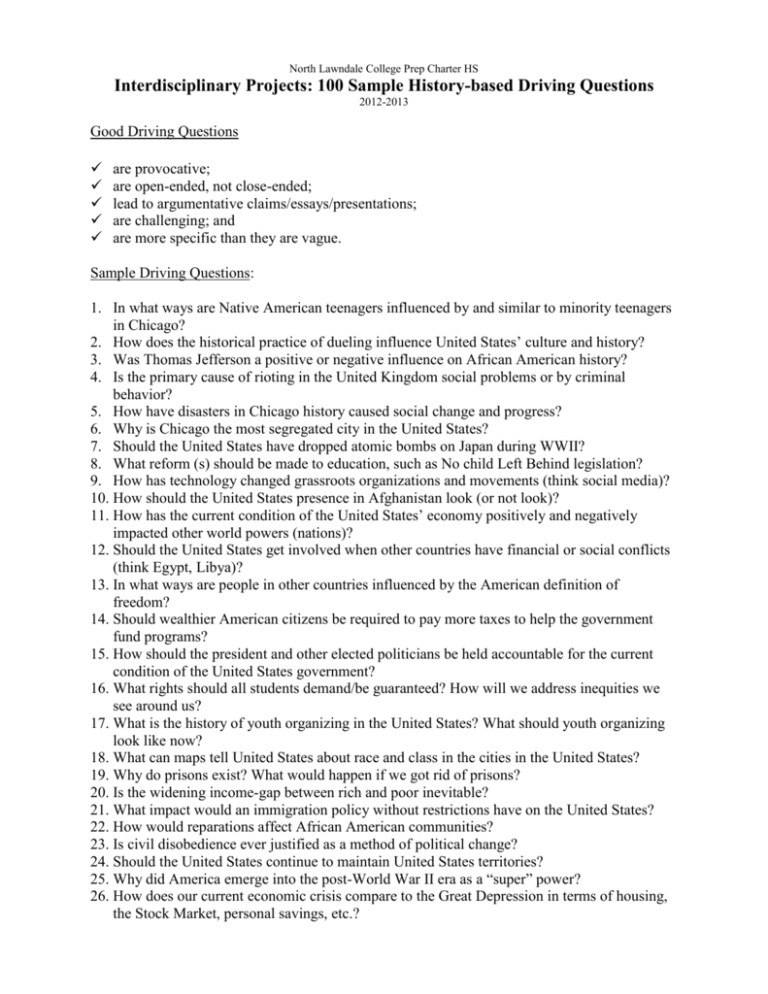
North Lawndale College Prep Charter HS Interdisciplinary Projects: 100 Sample History-based Driving Questions 2012-2013 Good Driving Questions are provocative; are open-ended, not close-ended; lead to argumentative claims/essays/presentations; are challenging; and are more specific than they are vague. Sample Driving Questions: 1. In what ways are Native American teenagers influenced by and similar to minority teenagers in Chicago? 2. How does the historical practice of dueling influence United States’ culture and history? 3. Was Thomas Jefferson a positive or negative influence on African American history? 4. Is the primary cause of rioting in the United Kingdom social problems or by criminal behavior? 5. How have disasters in Chicago history caused social change and progress? 6. Why is Chicago the most segregated city in the United States? 7. Should the United States have dropped atomic bombs on Japan during WWII? 8. What reform (s) should be made to education, such as No child Left Behind legislation? 9. How has technology changed grassroots organizations and movements (think social media)? 10. How should the United States presence in Afghanistan look (or not look)? 11. How has the current condition of the United States’ economy positively and negatively impacted other world powers (nations)? 12. Should the United States get involved when other countries have financial or social conflicts (think Egypt, Libya)? 13. In what ways are people in other countries influenced by the American definition of freedom? 14. Should wealthier American citizens be required to pay more taxes to help the government fund programs? 15. How should the president and other elected politicians be held accountable for the current condition of the United States government? 16. What rights should all students demand/be guaranteed? How will we address inequities we see around us? 17. What is the history of youth organizing in the United States? What should youth organizing look like now? 18. What can maps tell United States about race and class in the cities in the United States? 19. Why do prisons exist? What would happen if we got rid of prisons? 20. Is the widening income-gap between rich and poor inevitable? 21. What impact would an immigration policy without restrictions have on the United States? 22. How would reparations affect African American communities? 23. Is civil disobedience ever justified as a method of political change? 24. Should the United States continue to maintain United States territories? 25. Why did America emerge into the post-World War II era as a “super” power? 26. How does our current economic crisis compare to the Great Depression in terms of housing, the Stock Market, personal savings, etc.? 27. How does the United States decide when and where to intervene in another sovereign country’s affairs? 28. How does the German textbooks portrayal of WWII (and the events leading up to it) compare to American textbooks? 29. How would regulating greenhouse gas emissions impact global warming? 30. What impacts would youth advisory councils have on government policy? 31. Should the United States government be responsible for providing free or affordable healthcare for all Americans? 32. How accessible is the American Dream for undocumented immigrants? Documented immigrants? Minorities? The poor? 33. How do we balance protecting personal liberties and providing security for the nation? 34. How does gender differentiation in toy-making impact socialized gender norms for adults? 35. What are the advantages and disadvantages of the widespread use of organic products? 36. Why were minorities overrepresented in the Vietnam War? 37. Should the United States put a limit on the help/aid (military, monetary, etc) it provides to other countries? Why or why not? 38. How should the United States decide which countries it will assist financially (what would the set of criterion be)? 39. How do historians determine the reliability of primary and secondary sources? 40. How do varied interests influence how power distributed and exercised? (e.g., gerrymandering) 41. What is the impact of the lack of voter turnout (or presence of voter apathy) on certain communities? 42. How do the perspectives (or values) of a group influence its use of and impact on the environment? 43. How can studying racism in another country (such as South Africa) help Americans understand racism at home? 44. How do we balance the rights of the accused with the rights of the victims? 45. To what extent should students be protected by the Bill of Rights at school? (when it comes to freedom of expression or rights of the accused) 46. In what ways does the studying of history impact the development of teenagers? 47. Can changes in diet and upbringing make up for genetic abnormalities? 48. In what ways is brain development affected by experience? 49. What causes some children to be bullies? 50. Amnesty International has condemned the United States for executing mentally ill and developmentally disabled criminals; should we change our policy? 51. Some studies have shown that Americans work more hours and take fewer vacations than any other industrialized nation, yet paradoxically, we are less productive. Why and what can we do to change? 52. When criminal behavior can be explained by a medical condition, how should the criminal justice system respond? 53. Should public schools accept corporate sponsorship — if that involves allowing these sponsors to advertise and even name the schools? (This is being done in Philadelphia.) 54. How effective is the policy of traditionally awarding mothers custody of children in divorce cases? 55. How effective are alternative treatments for cancer? 56. How important is the IQ and educational background of a soldier? 57. How does the education received at for-profit colleges compare to those received in traditional colleges? 58. Why is important to take a “gap-year” between high-school and college, like the British? 59. How have parental bribes affected student success at school? 60. Was the collapse of the Aztec (or other) civilization inevitable? 61. How and why have explanations of the Iraq war changed since the early 1990s? 62. What were the consequences for establishing the Bronzeville community on Chicago’s south side? 63. How effective was Ida B. Wells Barnett (or another historical figure)? 64. How did World War II become a continuation of World War I? 65. Would America have entered World War II if Pearl Harbor hadn’t been attacked? 66. How did the Holocaust become a worldwide event? 67. Why does American society promote remembering the horrors of the Holocaust, but attempt to erase the history of slavery? (Changed sections of American textbooks, etc.) 68. How has the United States influenced other nations, and how have other nations influenced American politics and society? 69. How do the domestic politics and constitutional principles of the United States affect its relations with the world? 70. Are the Ideas of the Declaration of Independence still valid today? 71. Why has the American government refused to pay black descendants of slaves reparations? How has this impacted black citizens in the United States? 72. Did Affirmative Action policies in the United States give equality to minorities? How supportive or oppressive are these policies? 73. Can societies erase racial division? 74. What affect does a nation's access to resources have on its development? 75. Has the American government been a friend or foe to unionism? 76. How did the Spanish American War make the United States a world power? 77. How did the passage of the 19th amendment change America? 78. Was the United States justified in dropping the atomic bomb? How could America have ended World War II more peacefully? 79. What are the roles and responsibilities of citizens in a democratic nation? 80. How have government policies sustained social inequalities in the United States? 81. Why do some consider our method of electing a president undemocratic? 82. How are America’s Veterans treated? 83. Is there liberty and justice for all in America? How “just” is the criminal justice system for all Americans? 84. To what extent is American democracy fit the definition of democracy? 85. What is the real problem in Sudan? 86. Is there enough food to feed everyone in the world? How can we use food surpluses most effectively? 87. Why is education in America falling behind other countries? 88. Did segregation really end in America? To what extent does Chicago have de facto segregation, and what is the impact on society? 89. How is Rap rooted in Ancient Africa? 90. Why is there so much distrust of police? 91. Why does American society see ebonics as being incorrect? 92. When is war justified? 93. How do economic and political forces impact the development and/or underdevelopment of local and global communities? 94. How does geography affect economic inequality? 95. How does race and gender affect inequality? 96. How does economic inequality affect North Lawndale? 97. To what extent do we see the legacy of Dr. King’s dream in North Lawndale? 98. How can lessons learned from the election of Harold Washington be applied to the political process today? 99. To what extent is the death penalty constitutional or unconstitutional? 100. How can America close the racial gap in terms of academic achievement and standardized test scores?
